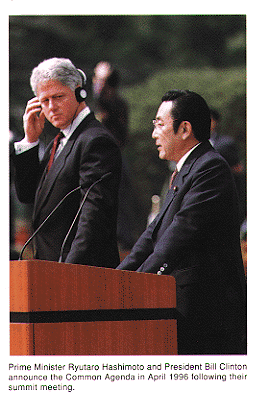Official Development Assistance (ODA)
12. Responding to Global Issues
(1) Japan-U.S. Common Agenda -- An Important Pillar of Japan-U.S. Relations
Japan joins other major donor countries in tackling global issues like environmental degradation and emerging infectious diseases which are threatening the lives of human beings. In partnership with the United States, Japan launched "Common Agenda for Cooperation in Global Perspective" in July 1993 as part of the efforts within the Framework Talks. Japan's ODA makes significant contributions to tackling such global issues as the environment, population, HIV/AIDS and Women in Development (WID).
(2) Environment -- Japan's Pledge at UNCED (the Earth Summit) Fulfilled a Year Ahead of Schedule

Japan committed itself to strengthening its efforts for environmental conservation at the United Nations Conference on Environment and Development (UNCED) held in Rio de Janeiro in 1992 by pledging to drastically expand its aid in the environmental sector to between ¥900 billion and ¥1,000 billion during the five-year period starting FY 1992. By the end of the fourth year (FY 1995), Japan implemented ¥980 billion, thus having fulfilled its pledge one year ahead of schedule.
In a move to persuade developing countries to give a higher priority to the environmental field, the Japanese Government dispatches survey missions to China and Southeast Asian countries to conduct policy dialogue and identify projects for environmental aid. In an effort to counter environmental pollution, Japan has financed the establishment of "environmental conservation centers" in China, Thailand and Indonesia, combined with technical cooperation which is now under way. For the protection of natural resources, Japan is carrying out a project, as part of Japan-U.S. cooperation, to conserve biodiversity in Indonesia. In addition, the two countries are studying the possibility of setting up a research center which would study ways to preserve coral reefs in the Asia-Pacific region.
(3) Population and HIV/AIDS -- $3 Billion Pledged over Seven Years till FY 2000
The United Nations Fund for Population (UNFPA) projects that the world's population, which was about 5.75 billion in mid-1995, will increase to 8.3 billion in 2025. Meanwhile, of all infectious diseases, AIDS is spreading extremely rapidly. The Joint U.N. Programme on HIV/AIDS (UNAIDS) estimates that an alarming 3.1 million more cases of HIV infection will develop in 1996, or an average of 8,500 new cases each day. Faced with such a situation, the International Conference on Population and Development (ICPD) was held in Cairo in September 1994, when active discussions were held on population and AIDS problems.
To help respond to these challenges globally, Japan in February 1992 announced the Global Issues Initiative (GII) on population and AIDS pledging $3 billion over seven years from FY 1994 to FY 2000. The Initiative has successfully been implemented achieving visible results with the aid commitments amounting to $1 billion during the first two years.
(4) Children's Health -- Support for the "Eradication of Polio by 2000"
In developing countries, many children die of curable diseases or the diseases which have been wiped out in developed countries. Among them are infectious diseases that can be prevented by vaccines. Japan has made outstanding achievements in this area, saving children by supplying vaccines in cooperation with WHO and UNICEF.
Regarding polio, Japan has been actively involved in accomplishing the WHO target of eradicating the disease from the Earth by 2000. The vaccine has been supplied with the emphasis on polio eradication in the West Pacific region. At the Ninth Session of the United Nations Conference on Trade and Development held in April 1996, Minister for Foreign Affairs Yukihiko Ikeda stated Japan's willingness to expand its anti-polio aid to the African region. In the childrenOs health field in the Common Agenda, Japan and the United States agreed in April 1996 to explore the possibility of cooperation in fighting iodine deficiency in developing countries.
(5) Women in Development (WID)
Women in developing countries are already assuming highly productive roles. For real progress of the developing world, these women, who represent half of the population, would have to be able to put their capacity to full use in the vanguard of developmental efforts and benefit from the result. In reality, however, women constitute 70% of the illiterate and suffer from gender inequality socially and otherwise. Such problems impede sustainable development.
At the Fourth World Conference on Women in Beijing in 1995, Japan announced an initiative that would expand its development assistance in the WID sector with emphasis on the improvement of women's status and rectification of gender disparity. In this regard, high priority will be given to (a) education, (b) health, (c) economic and social participation.
